


As we step into 2024, we are leaving behind a year stirred by major events — from politics to economy, conflicts to reconciliations, and countless decisive moments that have reshaped the global landscape. China Daily will review the moments that have changed the world while looking at what's in store the coming year.
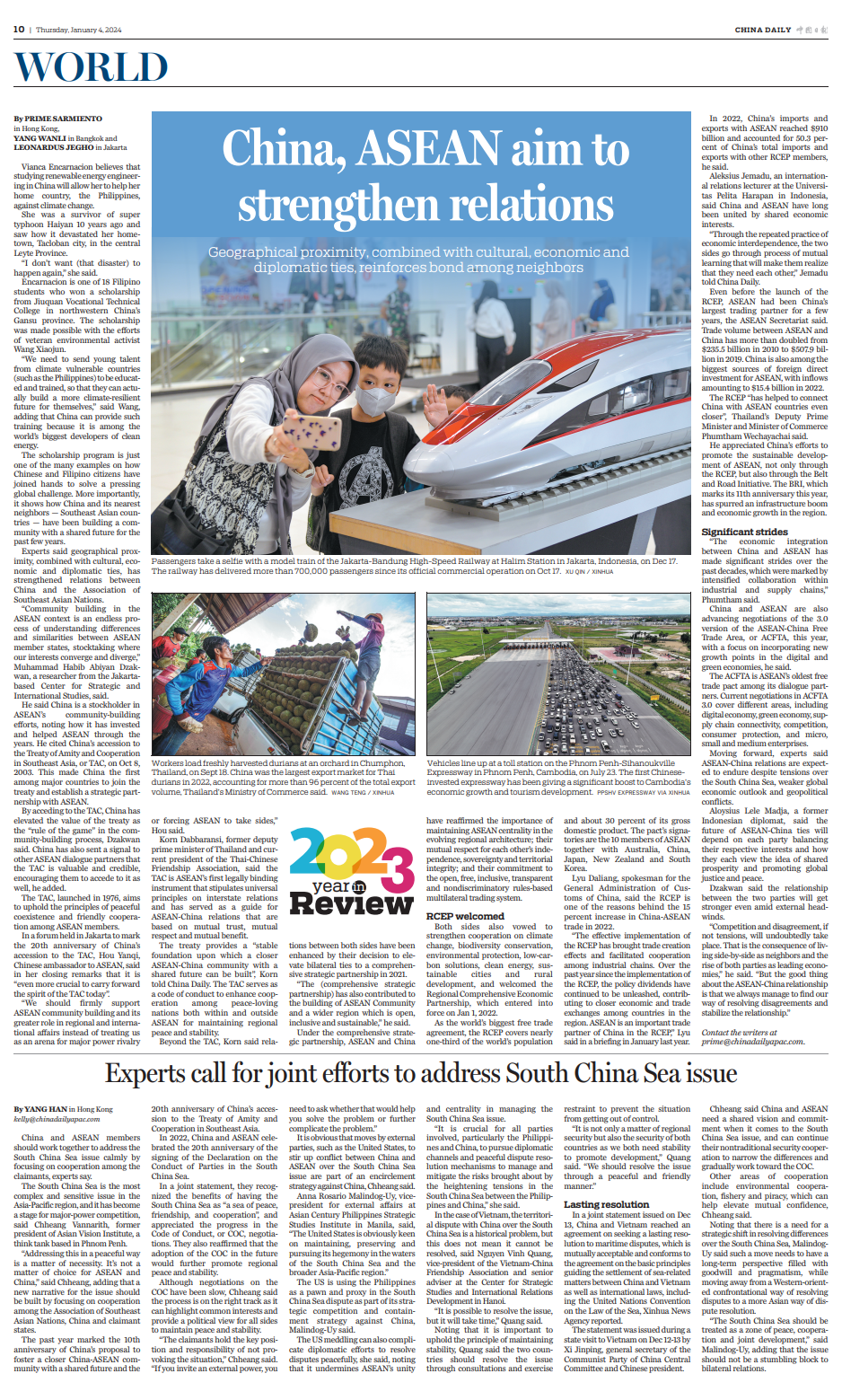
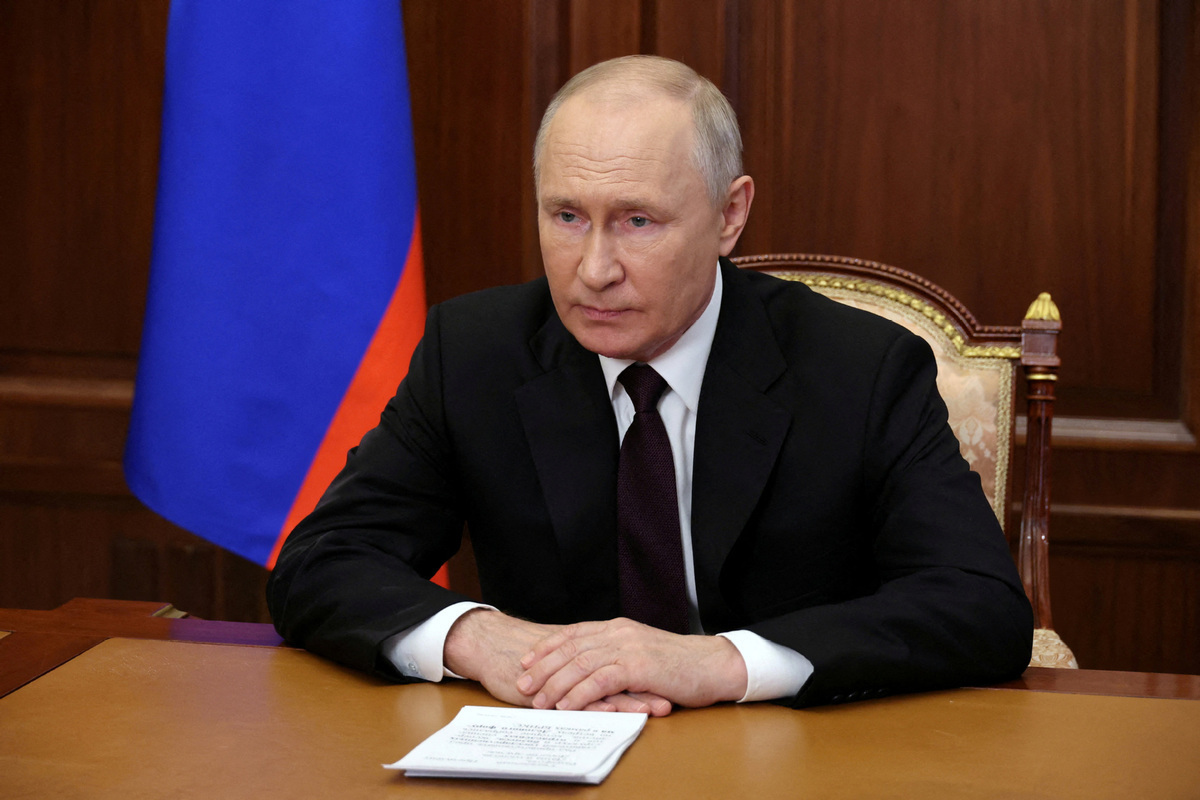
Russian President Vladimir Putin submitted documents to Russia's Central Election Commission on Monday to register as a self-nominated candidate in the 2024 presidential election.
"He submitted them," Kremlin spokesman Dmitry Peskov confirmed with Russian state media.
Putin, 71, who has been in the president or prime minister position for more than 20 years, announced in March he will seek another six-year term in an election he is expected to win.
The president will not run as a candidate for the ruling United Russia party, even though he has its complete support, but as an independent candidate, senior United Russia party official Andrey Turchak was quoted by RIA news agency as saying.
"More than 3.5 million party members and supporters will actively take part in the election campaign," Turchak said, noting that Putin was one of the founders of United Russia.
Under the current constitution of the Russian Federation, Putin is eligible to seek two more six-year terms after his current term expires next year.
Putin's supporters formally nominated him on Saturday to run in the 2024 election as an independent candidate.
Under Russian election law, nomination by a group of at least 500 supporters is mandatory for those not running on a party ticket. Independent candidates also need to gather at least 300,000 signatures of support from 40 regions or more.
The group that nominated Putin included top officials from United Russia, prominent Russian actors and singers, athletes and other public figures.
New restrictions
Putin's registration for the election came as the European Union Council adopted the 12th package of sanctions against Russia, according to a European Commission statement published on Monday, after Austria gave its final approval over the weekend.
The new sanctions target the lucrative diamonds industry, more than 140 officials and organizations, and closing loopholes that Moscow has used to bypass previous punitive measures, the statement said.
The import, purchase or transfer of Russian nonindustrial natural and synthetic diamonds and diamond jewelry will be banned starting Jan 1. The EU estimates Russia's diamond sector to be worth around $4.5 billion each year, The Associated Press reported.
The new round of sanctions also obliges EU companies to prohibit in their contracts the export of certain goods so buyers cannot sell them to Russia, particularly "sensitive goods and technology" that could be used by Russian armed forces in Ukraine.
Additional chemicals, lithium batteries, thermostats, certain electric motors that could be used in the manufacture of drones, and some machine tools and parts have been put on the EU's list of restricted items banned for export to Russia.

Despite sanctions, country's economy registers higher GDP growth, piling more stress on Kyiv's backers
In a widely predicted move, Russian President Vladimir Putin announced last month that he will run for a fifth term in the March 2024 presidential election.
If reelected, the 71-year-old leader, who has been in power since 2000 as president or prime minister, is expected to keep Russia on its path to pivot away from the West, experts say, while he might be ready to persist with the special military operation in Ukraine for a longer term to put mounting strain on the unity of Kyiv's Western backers.

The Kremlin's confidence is boosted by the country's better-than-expected GDP growth in the second year of Western sanctions, and experts see a promising economic development next year.
The Kremlin has been preparing for Putin's campaign all this past year, observers say, with Russian media regularly reporting on presidential administration meetings about election preparations.
During summer, Kremlin spokesman Dmitry Peskov said that Putin would easily win the 2024 election, though the latter claimed at the time that he had not yet decided if he would run.
In August, a Kremlin source told the RBC and independent Meduza news website that the goal is for Putin to win more than 80 percent of the votes, surpassing his 2018 performance.
Russian officials, including domestic policy chief Sergey Kiriyenko, have been seen at events with the heads of regional election commissions where the presidential election was discussed, The Moscow Times reported.
Oleg Ignatov, a senior analyst at the nonprofit International Crisis Group in Brussels, said the economy would be a key focus for both the Russian president and the government in the coming year.
"Revenues are growing. The sanctions have not worked. This came as a surprise even to the Kremlin itself," Ignatov said.
Huge sums of money have been invested in industry, factories are working around the clock, wages are rising, and expert forecasts say GDP growth by the end of this year will surpass 3.5 percent, higher than that of major Western countries.
"The West has strategically miscalculated," Alexander Dynkin, president of Primakov National Research Institute of World Economy and International Relations, Russian Academy of Sciences, told China Daily.
The West had hoped for an economic catastrophe in Russia after an unprecedented financial and economic war with more than 15,000 sanctions, and hoped for success of the economic blockade, said Dynkin, a key expert of the International Primakov Readings Forum, but "isolating Russia from the global market turned out to be untenable".
"New rounds of sanctions are marginal. All major and illegal restrictions have already been imposed. Therefore, I do not doubt the rationality of expectations of economic growth at a level close to 3 percent of GDP in 2024-25, which is almost twice as high as the forecast estimates for the developed countries," Dynkin said.
Feodor Voitolovsky, director of Primakov National Research Institute of World Economy and International Relations, said that since 2014, Russia has been progressively experiencing intensified sanctions from the United States and Europe, which significantly increased last year.
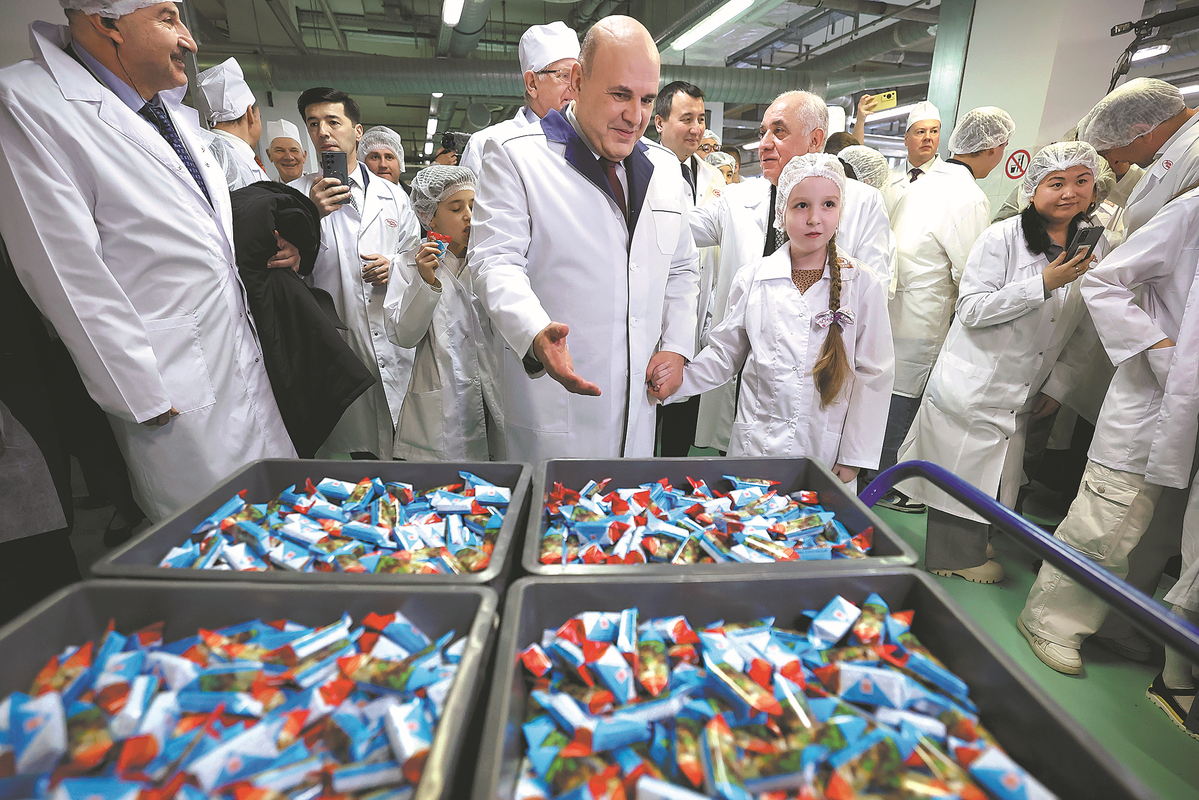
Withstanding pressure
Russia was able to withstand numerous rounds of sanctions by the US and its allies, which have been and still aim to reduce the development potential of sectors of the Russian economy, primarily oriented to foreign markets, as well as to limit the access of Russian companies to external sources of financial resources and technologies, said Voitolovsky, another key expert of the International Primakov Readings Forum.
US sanctions have been applied not only to Russia, but also to countries and companies that have worked with Russian partners. The goal of such measures by Washington is to break the trade and economic interdependence of Russia and the European Union.
"In 2022-23, main victims of the restrictive measures introduced by the US and supported by the EU were not only Russia but also almost all European economies that used to depend on Russian gas and oil and other goods and its market, as well as the absolute majority of the population in the European Union faced with an unprecedented increase in inflation, which had to be extinguished by increasing credit rates," Voitolovsky said, adding that the US was able to acquire a much larger segment of the European oil market and replace Russian pipeline gas with US LNG.
Nevertheless, the Russian economy is successfully adapting to the economic and political pressure from the US and its allies — none of the catastrophic scenarios predicted by Western forecasts have come true.
The banking sector is working properly, while leading Russian companies are expanding sales in Asian markets and have learned to skirt restrictions; logistics methods have changed but are working properly; and the Russian market has not become scarce — it is saturated with goods, including high-tech products. Russia has become one of the leading global players on food and LNG markets.
This means the failure of Western restrictions, Voitolovsky said.
Experts have warned that the successful transition to a "war economy" may carry long-term risks for the Kremlin, because the military operation has required increasing amounts of resources, and military spending has surpassed social spending.
Once the conflict ends, it will take time for Russia to rebuild its economy, but Western sanctions will remain, said Alexandra Prokopenko, a nonresident scholar at the Carnegie Russia Eurasia Center.
In addition, the special military operation in Ukraine has led to a gap of around 1 million people in Russia's labor market, according to independent demographer Alexei Raksha.
This includes between 300,000 and 500,000 people who were recruited into the army during the mobilization in 2021, while fewer foreign workers were arriving in Russia, and many were reportedly considering leaving the country.
Labor shortages are usually good news for workers. Wages rise, working conditions become more bearable, and workers who are discriminated against have more chances of finding employment.
This is the case in Russia now, especially at factories associated with state defense orders, where women, the elderly and people with disabilities are more in demand than ever.
But growth in employment and income comes at a high price, as many workers need to work overtime. Some plants that produce military equipment have introduced 12-hour working days and six-day working weeks.
Increased wages
Still, many employees are pleased to be earning more. An employee at the state-owned Russian car manufacturer AvtoVAZ, who gave his name as Sergey, said: "In our production, wages have increased. This is mainly due to the appearance of an absenteeism bonus.
"Those of us who didn't quit, now work seven days a week and overtime. All this is paid at double the rate. The salaries are good. It's realistic to get paid more than 150,000 roubles ($1,660). But the work, of course, is exhausting."
Another clear change in labor relations is the exploitation of teenage labor, including in military production. Russians were well aware this happened during World War II, but it seemed unimaginable in the present day until the outbreak of the current conflict.
Across Russia, demand for 14- to 18-year-olds has increased by 60-70 percent this year, according to recruiters, facilitated by a new law allowing minors to sign work contracts without the permission of their parents or guardians. Children between 14 and 16 can work up to 24 hours per week in certain sectors, rising to 36 hours for those over 16.
While military conflicts have complicated the lives of ordinary Russians, some moneyed Muscovites are living their best life, directly benefiting from the military operation, observers say.
"Moscow is bursting with money," observer Sergey Medvedev wrote on Facebook, pointing to military deals and surging oil sales.
Writing for the Carnegie Endowment for International Peace, Denis Volkov and Andrei Kolesnikov said last month that Russians adapted to the new economic conditions "in the space of just one year".
"Most Russians understand that the conflict in Ukraine will not end soon, and they try not to focus too much on military topics or developments at the front," they wrote.
Russian society, they said, has "learned to stop worrying about the conflicts".
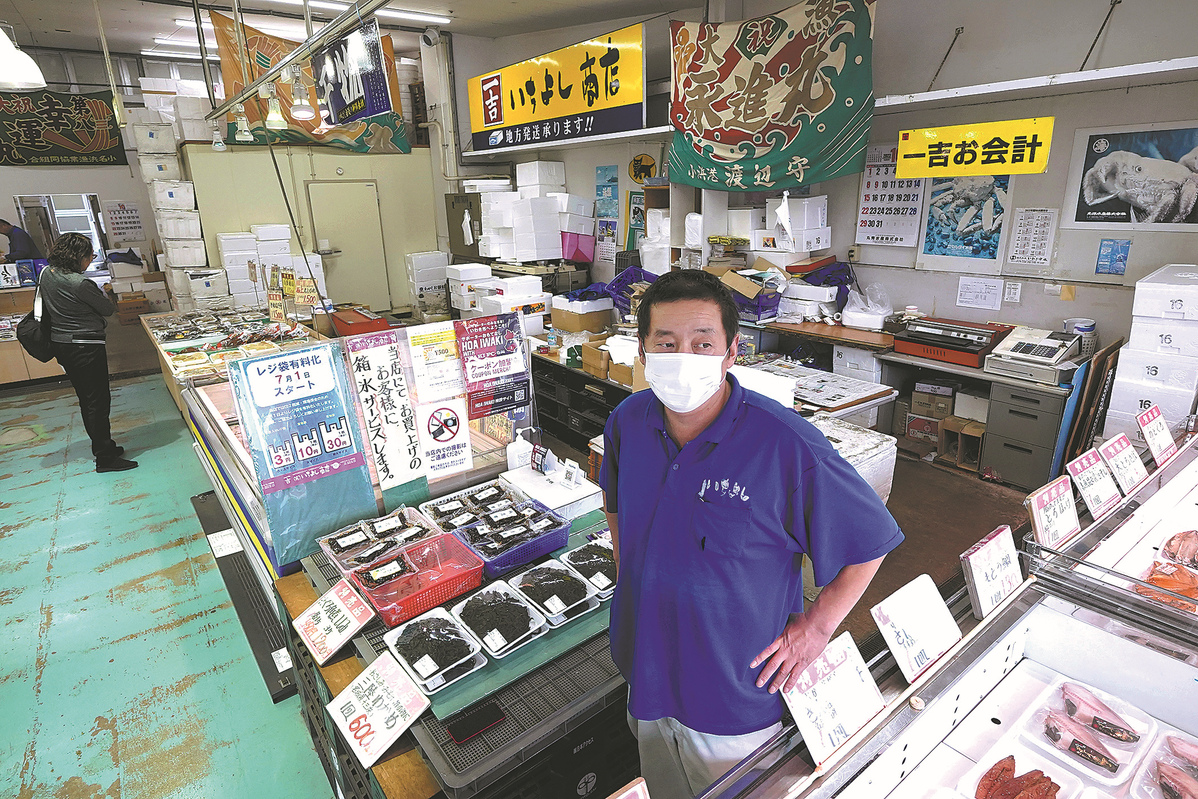
When I interviewed Japanese citizens at rallies protesting against the release of nuclear-contaminated water from the Fukushima Daiichi Nuclear Power Plant into the sea, I asked them a question: Considering that there is no sign of a halt to the ocean discharge, why do you still participate in such protests?
"To be honest, I don't see any possibility of a halt to the dumping of the radioactive water," said Toshihiko Sasaki, 71, a citizens' group member who lives in Chiba Prefecture. "The power of citizens is weak, but we won't give up."
Noriko Mukasa, a 72-year-old resident of Chiba, said: "We're all saying, 'Stop it, stop it', but I think that the voices of those who are saying 'stop' need to get louder. We can't just stay silent."
Chiyo Oda, an activist in Iwaki, Fukushima Prefecture, is one of the plaintiffs suing the Japanese government and Tokyo Electric Power Company, the operator of the crippled Fukushima plant, in an attempt to stop the ocean discharge. She is co-director of KOREUMI, also known as the Citizens' Conference to Condemn Further Pollution of the Ocean.
KOREUMI was formed primarily by Fukushima residents who have experienced the disaster following the nuclear accident at the Fukushima plant in March 2011, along with people across Japan who share the concerns, in the hope of preventing the spread of radiation that was released during the accident.
"What we can do, first and foremost, is to raise our voices to protect a peaceful everyday life," Oda said. "I believe it involves sharing that sentiment with people both domestically and internationally, demonstrating our opposition to the ocean discharge."
Members of the organization come from various backgrounds and lifestyles, each contributing with what they can.
"Casually discussing this issue with ordinary citizens living in the affected areas of Fukushima is in line with the purpose of KOREUMI," she said.
Societal change
"It is essential to share the issue through casual conversations with neighbors and people you meet in town, expressing concerns about the potential flow of radiation into the sea for the sake of children and grandchildren, and the desire to eat delicious fish with peace of mind. I believe that societal change can occur through such interactions."
Many Japanese citizens expressed understanding toward people from other countries who oppose Tokyo dumping nuclear-contaminated water into the sea.
"I don't want to eat contaminated fish or vegetables … I think Japanese and Chinese people share the same concern about not wanting to consume contaminated food," said Yuya Kamoshita, a former resident of Iwaki and one of the plaintiffs suing the Japanese government and TEPCO.
He said TEPCO should immediately stop discharging the nuclear-contaminated water into the sea.
Nahoko Hishiyama, secretary-general of a grassroots group opposed to a proposal by the late former Japanese prime minister Shinzo Abe to revise Japan's constitution, said, "The ocean discharge has caused trouble for countries around the world, and I feel very sorry about this."
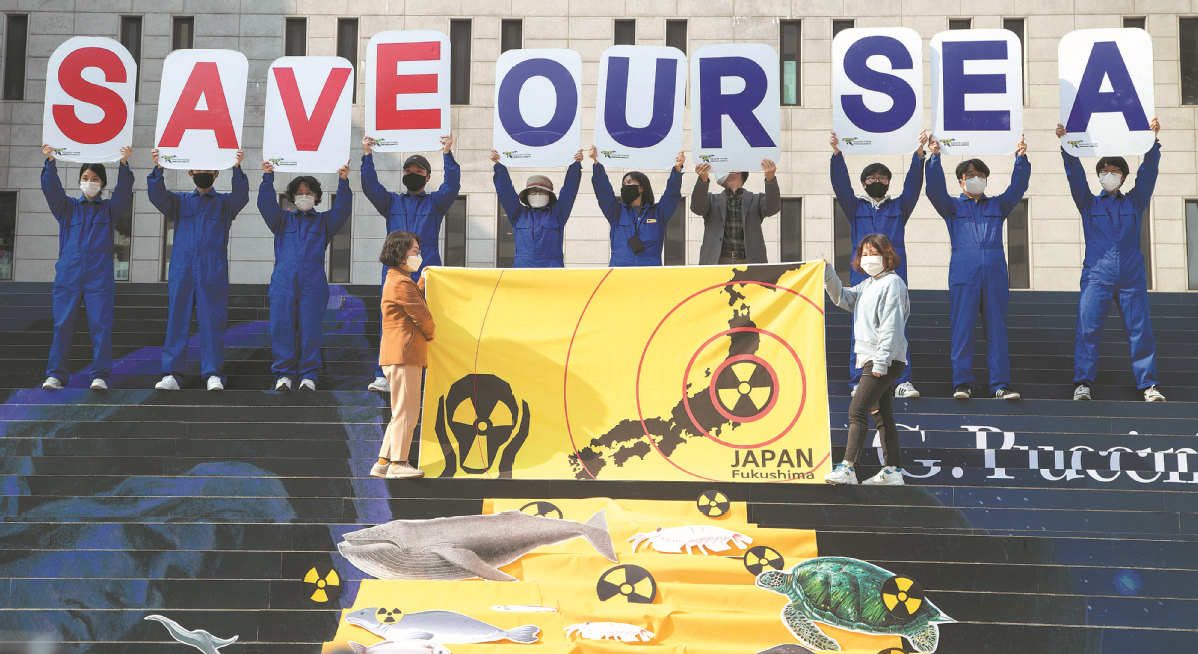
Hopes for safe maritime future dim as irresponsible discharge progresses amid legal rebuke from locals
Since the age of 15, Haruo Ono has been fishing in Japan's Fukushima Prefecture. But the discharge of nuclear-contaminated water from the crippled Fukushima nuclear plant into the Pacific Ocean has changed the fate of fishers like 71-year-old Ono.
In Fukushima, fishers have endured and persevered over the past decade.
Before the occurrence of the earthquake in 2011, fishers in the prefecture could freely fish in the sea. However, that is not the case now.
Ono told Xinhua News Agency in an interview that there are regulations specifying which species of fish can be caught, and limits on the quantity that can be caught in one fishing trip. Fishing levels have not yet returned to the levels before the earthquake.
Japan started releasing the first batch of radioactive water treated through a multinuclide removal system — around 7,800 metric tons — from the wrecked Fukushima plant on Aug 24. The plant suffered a triple meltdown in an earthquake and ensuing tsunami on March 11, 2011.
Tokyo Electric Power Company, or TEPCO, the operator of the plant, has so far completed releasing three batches of nuclear-contaminated water. It plans to discharge the fourth batch of around 7,800 tons during the current fiscal year that ends in March.
Furthermore, the disposal of nuclear-contaminated water will take decades to complete. Ono wondered why the Japanese government decided to release radioactive substances into the ocean when fishers still could not freely fish in the sea.
He said fishers take risks and endure hardships to fish not only out of pride as fishers, but also with the hope of allowing consumers to enjoy delicious fish.
Stressing that the ocean is not a trash can, he opposed the discharge of nuclear-contaminated water into the sea. In his opinion, such water should be stored in tanks.
One of his concerns stems from the fact that all three of his sons are fishermen, and he wants to ensure that they are not forced into economic hardship in the future.
On Sept 8, 151 individuals, including fishers from Fukushima, filed a lawsuit against the Japanese government and TEPCO in the Fukushima District Court, demanding a halt to the release of nuclear-contaminated water. By Nov 9, the number of plaintiffs in the lawsuit increased to 363.
Yuya Kamoshita, his wife and their younger son were among the plaintiffs. The Kamoshita family evacuated from Iwaki, a city about 50 kilometers away from the crippled plant, to Tokyo right after the March 2011 accident.
Emphasizing that dangerous substances should not be disposed of carelessly, Kamoshita said the contaminated water "contains a large amount of harmful substances" and should not be discharged into the sea.
"TEPCO's management of radioactive substances and the methods for detecting radiation concentrations have become increasingly lax," he said. "Some measurement results for the concentration of radioactive nuclides are now expressed as 'not detectable', without numerical values. In any case, TEPCO should provide a specific number. Otherwise, how can we trust the test results?"
Kamoshita said he did not believe there was no radiation leakage as the government claimed.
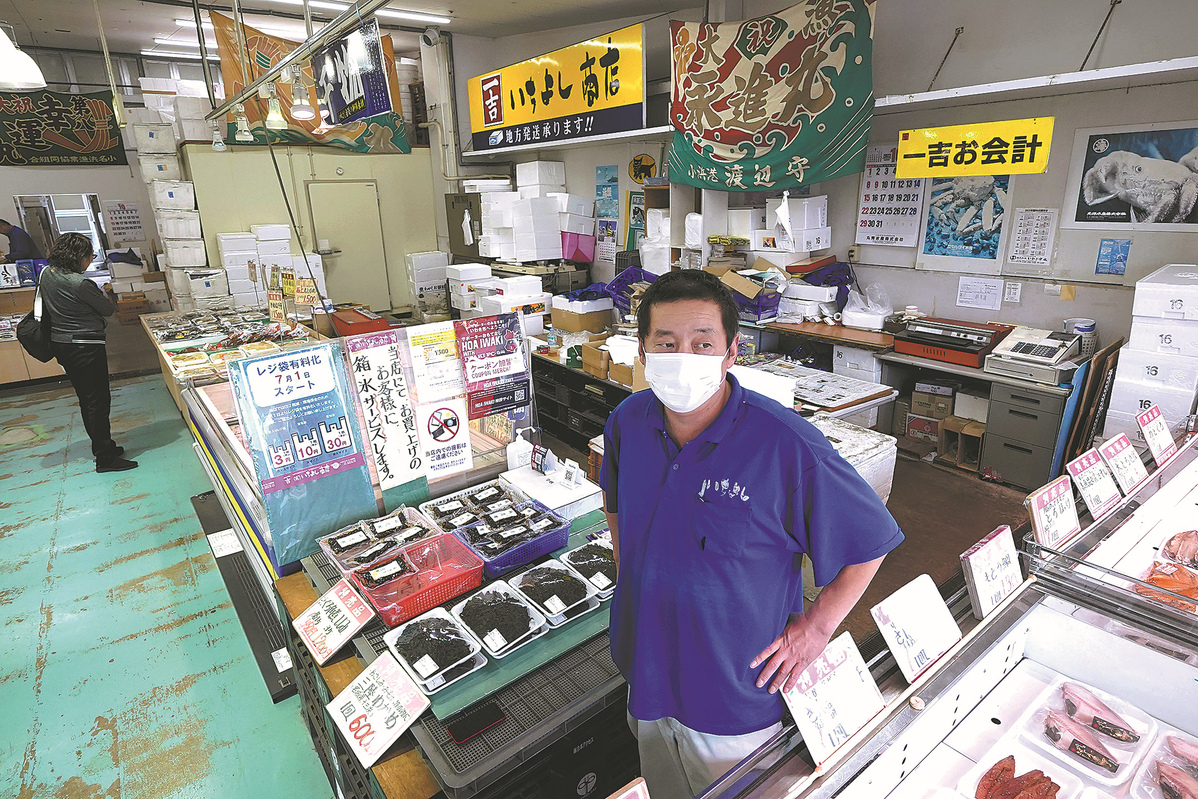
Severe radiation
To date, nuclear radiation in many locations in Fukushima is still severe, said Kamoshita, leader of the plaintiff group suing the Japanese government and TEPCO in another lawsuit, with the main goal of seeking compensation for radiation damage.
Five years after the nuclear accident, Kamoshita detected a high radiation concentration in his home in Iwaki, way above the safety limit. Some households among the plaintiffs had even higher concentrations in their homes.
"TEPCO has neglected these issues. As long as our homes are outside the evacuation-designated zones, TEPCO does not take action to eliminate radiation contamination," Kamoshita said.
"When I lived in Iwaki, I used to be able to go into the mountains to pick wild vegetables. However, these activities are no longer possible, and restoring our lives to the previous state is now impossible."
Because of health concerns, Kamoshita quit his job as a microbiology teacher in Iwaki and secured a temporary position at a Tokyo university. To make ends meet, he also works in real estate management.
Given Tokyo's high housing cost, he is now renting a small house and living in the city with his elder son, while his wife is living in Yokohama with their younger son. Many male evacuees from Fukushima are also separated from their wives and children.
There are more than 30 lawsuits filed in Japan against the government and TEPCO, with a total of around 13,000 plaintiffs, Kamoshita said.
"Our purpose in filing the lawsuits is not only to obtain compensation, but also to have the government acknowledge some responsibility for the Fukushima nuclear accident."
Chiyo Oda, co-director of KOREUMI, or the Citizens' Conference to Condemn Further Pollution of the Ocean in Iwaki, said the Fukushima nuclear accident had a significant impact, changing everything in their daily lives and routines.
"Even more than 12 years after the accident, living with the awareness of radiation in our surroundings is something that did not exist before the accident," Oda said.
Even now, radiation measurements are still being conducted in many places. The effects of radiation vary depending on lifestyles, age and health conditions, but there have been persistent concerns about long-term exposure to low doses since the accident, Oda said.
Like Kamoshita, Oda is one of the plaintiffs suing the Japanese government and TEPCO in an attempt to stop the discharge of nuclear-contaminated water into the ocean.
"I view this lawsuit from a broad perspective as a claim to the right to live on Earth. Even if it were to result in a loss, it does not negate that assertion," she said.
Continuing to dump nuclear-contaminated water into the sea will perpetuate the damage caused by the accident, because such actions will spread radiation into the interconnected oceans of the world. Just as the nuclear accident should not have occurred, ocean discharge should also not have taken place, she said.
Concerned about the impact on the marine ecosystem, from seaweed and plankton to seafood and humans who consume them, she said radiation is known to affect at the genetic level, and depending on the nuclide, it can have various effects on different organs.
The psychological effect on people who are fond of the sea is also immeasurable.
"Every time we see the beautiful sea, the thought that radiation is flowing here crosses our minds," Oda said. "It saddens me to think that children might no longer be able to enjoy activities like swimming in the sea or playing by the shore. This is something that cannot be expressed in numbers or words."
She said she believes the Japanese government should disclose requested information regarding the ocean discharge, including details about the amount and types of radioactive substances released.
"The government should seek understanding and cooperation from all nations and individuals involved in this ocean discharge. It is crucial to reveal opinions from overseas to understand perspectives from abroad," she said.
The Japanese government keeps emphasizing that water released from the Fukushima plant is treated water, not nuclear-contaminated water. But Motoo Tomizuka, a member of nonprofit No Nukes Plaza Tokyo, has a different view.
"It's not treated water but contaminated water. This is because the treatment is extremely insufficient," Tomizuka said. "Since the water has been discharged recently, it is difficult to determine the impact. In the future, I think it will affect not only Japan, but also countries along the Pacific coast."
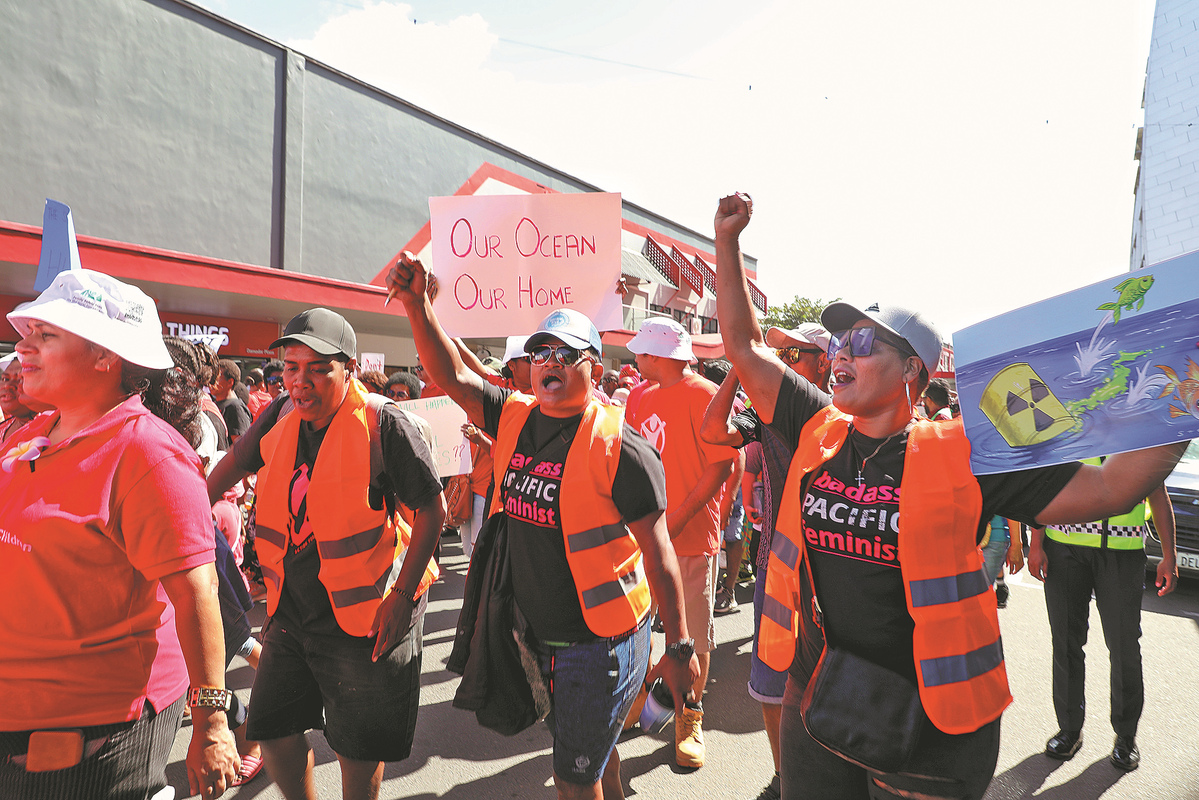
Main concern
The main concern is health problems resulting from internal exposure caused by the consumption of food, particularly seafood.
Health damage from radiation, such as childhood thyroid cancer, heart attacks and increased perinatal mortality in newborns, is not immediately apparent, but has occurred in previous nuclear accidents and it is expected to increase, Tomizuka said.
Hisataka Yamasaki, co-representative of No Nukes Plaza Tokyo, said what he finds most unacceptable about the ocean discharge is "the ease with which the government and TEPCO tell lies".
"They betrayed their promise not to dump nuclear-contaminated water without the consent of the fishing industry. They lied about not having enough land for storage. Moreover, they also largely increased the estimated cost of the ocean discharge and significantly extended the estimated duration," Yamasaki said.
"They have continuously deceived the public and international opinion with convenient explanations. Can they still claim the release of nuclear-contaminated water is safe in the future?"
The Japanese government and TEPCO have repeatedly said the discharge of Fukushima water meets international safety standards. A safety review conducted by the International Atomic Energy Agency had concluded that Japan's plans to release treated water from the Fukushima plant into the sea are consistent with IAEA safety standards.
However, many Japanese citizens said they do not believe such pronouncements. The government and TEPCO, and even the IAEA, have lost the trust of some people.
"Basically, the IAEA makes judgments based solely on TEPCO's measurement data and explanations, and the IAEA neither recommends nor permits the ocean discharge of contaminated water," Yamasaki said.
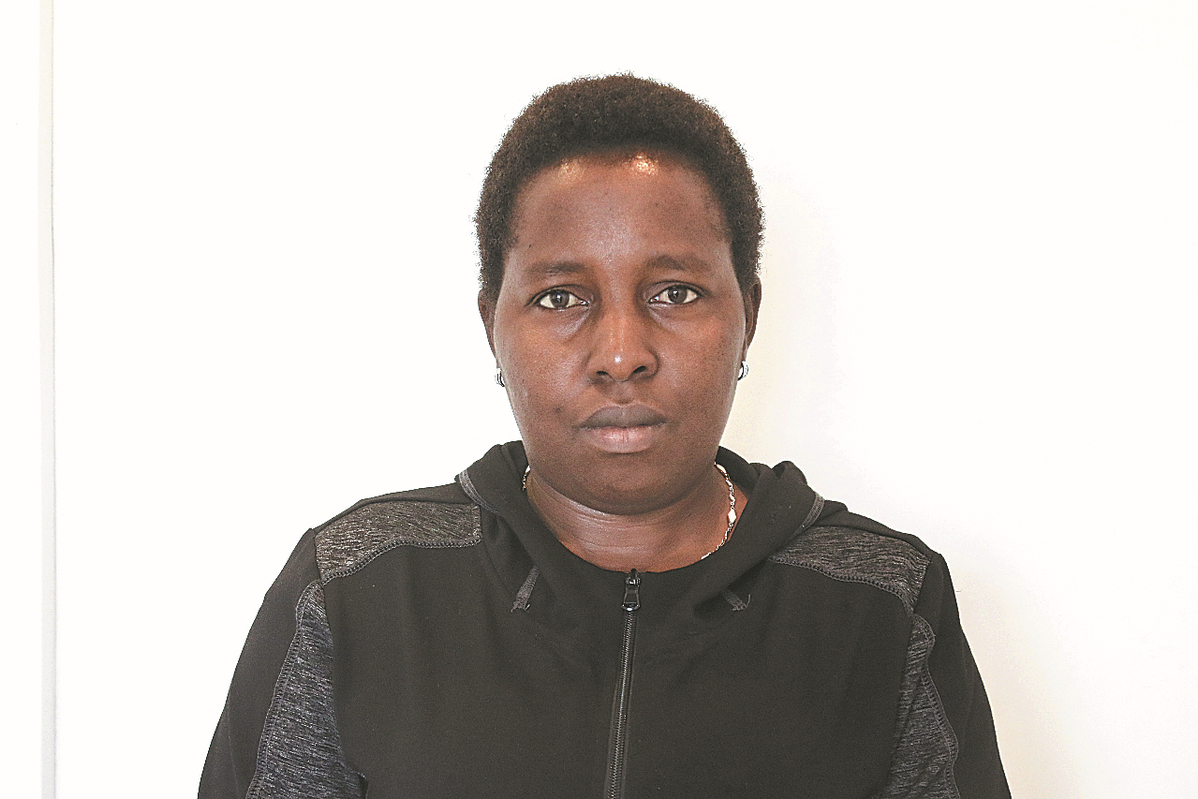
When I was given an assignment to cover the BRICS Summit in South Africa in August, I was overjoyed. It was my first time to attend the summit in person, so I was expectant and open-minded to learn.
With the presence of heads of state from BRICS countries, security was really tight. Many roads leading to the Sandton Convention Centre, the venue of the summit in Johannesburg, had been closed save for vehicles transporting the high-level delegates.
At the convention center, some entrances were reserved for delegates, government officials and heads of state.
For many journalists it was a real headache on the first day of the summit trying to locate the entrance to the media center, which hosted hundreds of journalists from across the globe.
Numerous security officials had been deployed in the capital, specifically around Sandton, to ensure the summit took place in a safe and secure environment.
As the event kicked off on Aug 22, expectations were high on the deliberations and outcomes on the expansion of the grouping, "de-dollarization" and what BRICS had in store for Africa, as the summit was happening on the continent.
By the close of the meeting on Aug 24 the Johannesburg summit had achieved a milestone for the BRICS grouping, the key highlight being the agreement to admit six new member countries.
The expectations for the summit as well as the enlargement of the grouping were highly publicized by the media, increasing its popularity among people especially across Africa.
Contrary to the expectations of many, the summit did not feature the de-dollarization deliberations, but member countries emphasized increased use of local currencies in trade among themselves.
Nevertheless, hopes are still alive that in the near future, even though it is a complex issue, an alternative to the dollar will be established to protect countries against the impact of dollar inflation on local currencies.
Judging from the discussions since its formation, BRICS presents itself as a key platform for cooperation especially among emerging economies. This is evidenced by the interest shown by countries to join the bloc.
Prior to this year's summit 40 countries had expressed interest in joining the grouping, and more than 20 had formally applied.
BRICS' commitment to uphold multilateralism, represent the voice of the developing and emerging economies, and reform the global governance system are some of the reasons behind the interest in joining the grouping.
BRICS has consistently advocated fair treatment of developing countries, the reason Africa sees BRICS as an important platform where it will lobby in favor of its interests.
BRICS also presents numerous opportunities for Africa to grow its trade and attract direct investment.
Through BRICS, Africa has an opportunity to get technology transfer, especially in manufacturing. Those who were lucky to be admitted to the grouping should set their priorities right to fully benefit from the opportunities presented.
Despite being endowed with vast natural resources, Africa remains the continent with the poorest countries.
According to the United Nations, Africa holds 40 percent of the world's gold and up to 90 percent of its chromium and platinum. The largest reserves of cobalt, diamonds, platinum and uranium in the world are in Africa.
It also holds 65 percent of the world's arable land and 10 percent of the world's internal renewable fresh water source.
Africa's partnership with BRICS will thus be a game changer — the continent boasts vast natural resources while the grouping boasts technology, innovations and has financial capabilities.
With all eyes on the 16th BRICS summit to be held in Kazan, Russia, expectations are high on what is next after the expansion.
Meanwhile, it is my hope that going forward BRICS will play a bigger role in advancing the interests of developing countries economically in the global landscape.

Inclusion of six new members promises to reshape world economic and political order
The BRICS Summit held in South Africa this year will go down in history as a meeting at which a milestone was reached to shape the group's direction.
During the summit in Johannesburg the BRICS group of emerging economies of Brazil, China, India, Russia and South Africa extended an invitation to Argentina, Egypt, Ethiopia, Iran, Saudi Arabia and the United Arab Emirates that are expected to officially join the group next month.
After the enlargement, experts say, the platform will increase the influence of the Global South, which has traditionally been neglected in terms of economic growth and policies.
Aly Khan, an investment banker in Kenya, said the recent developments in BRICS, such as greater cohesion, its expansion and growing local currency settlement, all point to a grouping that is flexing its muscle.
BRICS expansion is significant, he said, foreshadowing a potentially new financial architecture and an ambition to reform global governance.
Cavince Adhere, an expert on international relations with a focus on China-Africa relations, said BRICS expansion will make the bloc an important platform for international collaboration, especially among Global South countries.
The bloc, with a combined population of more than 3.2 billion, accounts for about 42 percent of the world's population, a quarter of world GDP and 17 percent of world trade.
"That tells you how important it is," Adhere said. "It's now composed of the largest market in the world."
The bloc also brings together resource-rich countries, he said.
The future of BRICS will depend on its ability to deliver on the aspirations of the members that have already joined and those that are keen to join, he said.
"The 2023 summit held in South Africa was modeled on BRICS cooperation with African countries. And that simply tells of the strategic direction that the leaders of the BRICS countries are moving in — not leaving anybody behind."
The emergence of BRICS is a reflection of the desires of Global South countries to come together and reimagine their development discourse in addition to giving themselves a voice in global governance, he said.
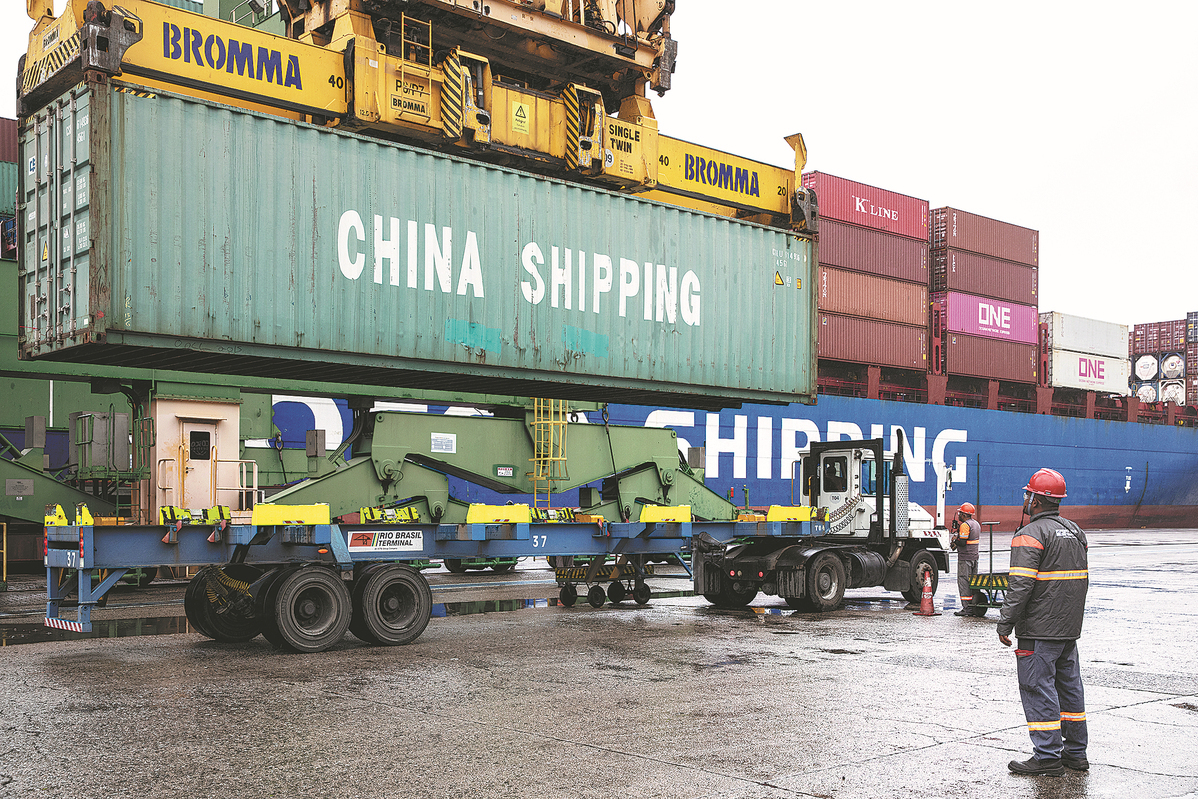
BRICS is at a watershed in terms of global economic organizations, he said, with less-developed countries now having access to technology from more advanced ones, and having an opportunity to diversify their exports and gain access to new sources of funding.
"BRICS holds a very prime position for aspirations and development discourse, especially among poor countries.
"We are going to closely watch how it galvanizes, negotiates and delivers on the aspirations of the members that are joining in terms of development."
Member countries should discuss strengthening intergroup collaboration in a number of fields, including cultural exchanges, science and technology, he said.
Xn Iraki, an associate professor in the Faculty of Business and Management Sciences of the University of Nairobi, said BRICS gives the Global South an opportunity to articulate its issues, set its priorities, join like-minded countries, gain a chance to engage in the transfer of technology, and gain a new identity.
BRICS should provide a forum where the Global South will discuss its interests, economic and political dreams, Iraki said, as well as be a venue where those of the Global South can be heard and treated as equals.
"BRICS should be a place where countries see economic prospect, economic growth, more trade and higher standards of living for their citizens."
The expansion of the grouping will gain more recognition because there must be something good that attracted the new members, he said.
"Let's sell BRICS by showing those who have joined as well as the new members the benefits they are going to get. Once that is publicized, then BRICS will grow faster."

Formidable force
Augustin Fosu, a professor in the Institute of Statistical, Social and Economic Research of the University of Ghana, said the total population of the 11 countries will be more than half the world's population and will account for a quarter of the world's GDP, a fact that makes the new grouping a formidable global force.
A BRICS currency could also challenge the euro and the dollar in global trade, Fosu said, even though he does not believe that the greenback's days are numbered.
"This is because the grouping is quite heterogeneous in terms of economic interests. Thus, managing such a currency would be most challenging. Indeed, the euro has so far failed to significantly mitigate the importance of the dollar."
Iraki said there are fears that through BRICS the dollar will become weaker and that many countries are supporting "de-dollarization".
"There is a consensus across the globe for an alternative to dollar, whether through BRICS or any other forum. Having an alternative to the dollar will give countries choices on what reserve currency they want to use."
Adhere said BRICS countries should focus on settling trade using its members' own currencies.
Countries not aligned with the interests of the United States have been cut off from accessing the dollar, making international trade maneuvers very difficult, he said.
"If BRICS countries can promote their own currencies it would shorten the time that is taken to do international trade. It would also eliminate increased finances onto the debt because of the dollar inflation."
BRICS provides an opportunity for countries that have been underrepresented and punished or targeted by certain Western countries to overcome things such as sanctions, he said.
Some countries are collaborating within BRICS to offer financial services without involving the dollar, he said.
"The Egyptian government is considering a yuan dominated bond, so there is a possibility that once the dollar is out of the equation, sanction issues are diminished, and therefore it will not be used as a punishment tool, as has been the case."
With two more African countries joining BRICS from Jan 1, the continent has the opportunity to use them to make the most of development of the entire continent.
Fosu of the University of Ghana said Egypt and South Africa are two of the largest African economies in terms of GDP, the latter being a major trading partner in Africa, particularly in the Southern African Development Community, in which it accounts for about half the trade.
"The BRICS membership will be consequential for other African countries, especially in the light of the African Continental Free Trade Area, of which both Egypt and South Africa are members."
The three African countries nearly span the continent, north, south and east, which could be geopolitically strategic, Fosu said.
Iraki said that through BRICS African countries will be able to use their economic voices and will also be in a stronger bargaining position.
"We hope BRICS will serve as an umbrella to protect African countries from those who don't have good intentions on the continent. There has been a lot of imbalance in the world trade and business environment, so through BRICS I expect African countries to get economic and trade justice."
Iraki urged the African Union to consider partnering with BRICS to make the African market more vibrant.
Khan the investment banker said it is clear that the world is no longer unipolar, which the unipolar power is unhappy about.
Adhere said that geopolitically BRICS brings countries together and gives them an opportunity to reimagine their political destiny and bolster their political collaboration.
BRICS is enabling countries to widen their scope of collaborative opportunities, thereby becoming a geopolitical phenomenon that everyone will be watching, he said.
There have been fears that following the expansion, division and competing interests in BRICS could make it hard to reach consensus on key issues.

Greater alignment
Khan said he does not see such lack of cohesion as an issue, and that instead over time there will be greater alignment. The unity of the grouping will depend on its flexibility, openness and creating its own internal organic cohesion, he said.
"One ... attractiveness of the grouping is having diversification of opinion, but overall you know the ship is sailing to a particular place. But on the way it could take different types of diversions.
"Who would have thought, for example, that Saudi Arabia and Iran could find alignment? But look at what is happening since the Chinese-brokered peace deal (between the two sides in March). We have had this alignment take shape and form. It's truly remarkable."
Adhere said that despite possible problems that pit individual member states against one another, countries speak in a consensus fashion when it comes to BRICS' decision-making.
"We hope as more countries join, the primary drive to deliver development for their people will override the seemingly small tensions that may appear between countries."
Delivery of the desires of the joining members is the biggest tool that the BRICS countries have to build coherence, relevance and sustainability, he said. This is in addition to ensuring that members do not face the kind of traditional problems that they faced with Global North partners.
